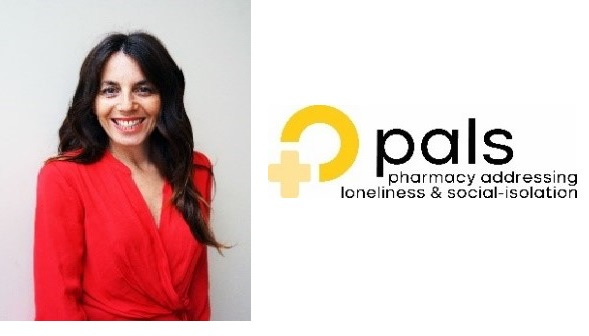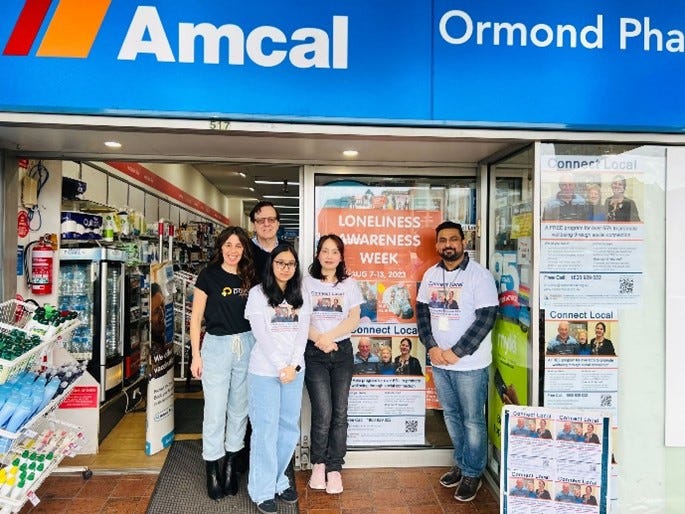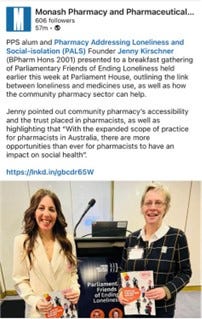
Tell us about your role and why PALS was founded.
My name is Jenny. I am a pharmacist and the founder of PALS (Pharmacy Addressing Loneliness and Social isolation) - https://palsglobalnetwork.com
My interest in loneliness stemmed from my personal experiences of loneliness and PALS was founded to raise awareness, and educate the pharmacy community about the significant health impacts of loneliness. My belief is that if pharmacy staff appreciate the health impacts of loneliness, then they will feel compelled to act upon the loneliness that they often identify in their patients.
What is the mission and value of PALS?
PALS is the first international pharmacy initiative committed to raising awareness and addressing loneliness and social isolation to improve the health of patients and society. The longer-term goal is for an in-depth understanding of the health effects associated with loneliness and social isolation, and how to address them, to become an intrinsic part of pharmacy practice globally.
The role of pharmacy in addressing loneliness, social connection and sharing belonging
Pharmacies have a unique and personal relationship with their patients. Pharmacists and pharmacy staff all know of the many patients who come in more often just so they can come in for an extra chat. For many older individuals who are vulnerable and live alone, pharmacy staff are sometimes their only regular face to face contact. It is important to recognise that loneliness can impact all ages and not just the elderly. In the case of community pharmacy, however, it is often the elderly patients that pharmacy staff see regularly.
The social capital that pharmacists possess within their local communities is invaluable, enabling them to identify and address the broader social context (like loneliness) that influences physical, cognitive and mental health outcomes and medication usage.
Community pharmacy is poised for effective public health efforts including addressing loneliness and promoting social connection and belonging1.[1] In Australia, for example:
Pharmacists and are one of the most trusted health professionals with public opinion surveys have shown that 84% of adults trust the advice they receive from pharmacists2.
Pharmacists are also the most frequently accessed health professionals - on average, every person visiting a community pharmacy in Australia 18 times each year.
Community pharmacy is highly accessible.
There are 5,822 community pharmacies in urban, rural and remote areas of Australia. In Australian capital cities, 97 per cent of people have access to at least one pharmacy within 2.5 km radius.
Close to 40% of the community pharmacies in Australia are open after-hours, including weekends.
Community pharmacy service the whole community, across all age group, including individuals at greater risk of loneliness. For example, migrants from non-English speaking countries, new mums, & older adults with hearing loss.
Importantly, loneliness has already been found to be a contributing factor to health service use. And use of community pharmacies is no different with recent research evidence showing loneliness is associated with increased use of pharmacy services3.
There is also a relationship between loneliness and medication use with research showing that loneliness was associated with polypharmacy and greater opioid and benzodiazepines use in older adults4. More research is required for full appreciation of these relationships but it does highlight another significant reason for intervening on loneliness and the relevance to pharmacy.
How can pharmacy help?
Increase the awareness of loneliness
Educate patients, and carers, about the health impacts of loneliness and the importance of social health.
Support initiatives like Loneliness Awareness Week in the pharmacy
Advocate for increased attention on addressing loneliness as a government level
Reduce the stigma of loneliness
Create emotionally safe spaces in the community pharmacy so patients can talk about their experiences of loneliness
Empower individuals to take action
Pharmacy staff can empower patients to take action toward greater social health, connection and belonging, reducing their loneliness which not only improves quality of life, but can also result in greater health outcomes.
For example, utilise social prescribing principles - pharmacists can ‘prescribe’ local activities to patients to promote social connectedness. Social Prescribing is gaining popularity globally with an opportunity for pharmacy involvement (see Social prescribing in pharmacies: What is it, does it work and what does it mean for Canadian pharmacies?). Pharmacy staff could create a list of their community’s existing resources and local social activities.
Loneliness is complex and is a growing health concern, with potential significant negative health outcomes. With the expanded scope of practice for pharmacists, across different practice locations and critical access points including general practice, community, hospital, aged care and in people’s homes as home medication review pharmacists, there are more opportunities than ever for pharmacists to have an impact on social health and promote social connection and belonging.
Examples: Pharmacy addressing loneliness
There was a pharmacist named Amanda from Perth Australia who set up a PenPal program between elderly patients of the pharmacy and a local primary school. There was an ongoing exchange of letters and at some stage the pharmacy patients met their PenPal face to face over a morning tea. One of the patients had significant heart failure and shares that it was because of his pen pal that he decided to live.
There is another pharmacist named Anika and she writes weekly notes (just a simple gesture of care) and places them into the prescription bags for some patients who are unable to attend the pharmacy and have their medications delivered. The pharmacist discovered that a particular lady had been collecting these notes for months and had stored them in an envelope to keep them safe. This really shows how much the lady valued this gesture of care and helped her to feel seen and hear and connected.
Pharmacists often deliver health promotion and prevention presentations at local community centres and schools. Pharmacist Jenny Kirschner spoke about #loneliness to over 70 grade 2 students (children aged 8-9 years) at a local primary school as an early intervention to introduce the word loneliness, provide an understanding of the experience and education on how to respond to loneliness.
A pharmacy has set up a “Chatty Café” in the café that is part of their pharmacy. The Chatty Cafe initiative is about building friendly social connections to brighten someone's day. The pharmacy reserves a Chatty Table in their cafe every Friday with a message that there is no need to RSVP, just show up, take a seat, meet new people and have a chat. There will always be someone to listen and care.
How can the pharmacy profession actively contribute to alleviating loneliness?
My call to action is for all pharmacy staff to learn about the risk factors for loneliness. Pharmacy staff can also talk about loneliness more openly to help reduce any stigma, include social health recommendations as part of lifestyle counselling and medication adherence support, and follow up and monitor individuals at risk of loneliness.
If you are a pharmacy around the world doing something to address loneliness, please reach out as I would love to share your story.
How can we learn more?
You can learn more about PALS here - https://palsglobalnetwork.com/
FREE PALS downloadable guide: A guide to loneliness: the thing I wish I knew about loneliness.
Follow PALS on LinkedIn and like and share the content to help raise awareness.
Email me on hello@palsglobalnetwork.com with any questions or ideas
Jenny Kirscher BPharm (hons) has over 20 years of experience in the healthcare and pharmacy sector. She has worked as a clinical and retail pharmacist, a health coach for lifestyle modification programs and as a National Health Services Pharmacist delivering impactful and innovative health programs. Jenny is also the founder of PALS (Pharmacy Addressing Loneliness and Social-isolation).
PALS is the first international pharmacy initiative committed to raising awareness and addressing loneliness and social isolation to improve the health of patients and society. The longer-term goal is for an in-depth understanding of the health effects associated with loneliness and social isolation, and how to address them, to become an intrinsic part of pharmacy practice across Australia and globally.
Jenny understands loneliness from lived experience, and is now a published authority on loneliness educating pharmacists on the physical, mental and cognitive health impacts of loneliness. Jenny has written articles on loneliness for the AJP (Australian Journal of Pharmacy) and Australian Pharmacist.
In Australia, Jenny has presented on loneliness at peak national pharmacy education conferences (Pharmaceutical Society of Australia) and at a Parliamentary House event championing the pivotal role that pharmacists can play in addressing loneliness.
Jenny also proudly serves as the Australian ambassador for the International Social Prescribing Pharmacy Association (ISPPA).
Her experience and ongoing consultation with loneliness and social connection key opinion leaders has culminated in the development of the world's first pharmacy training program on loneliness, featuring interviews with leading connection experts such as Professor Julianne Holt-Lunstad (Professor of Psychology and Neuroscience) and Dr Christopher Mikton – Scientific Lead on the Commission for Social Connection at the World Health Organisation (WHO).
Jenny's visionary spirit is exemplified by her acceptance into the Australian Clinical Entrepreneur program 2023 (based on the NHS Clinical Entrepreneur Program) where she is currently conceptualising a tech enabled solution to better identify and respond to loneliness.
https://www.pharmacyitk.com.au/vital-facts-on-community-pharmacy/
https://www.pharmacyitk.com.au/vital-facts-on-community-pharmacy/
https://pubmed.ncbi.nlm.nih.gov/37181502/
https://pubmed.ncbi.nlm.nih.gov/32931548/





